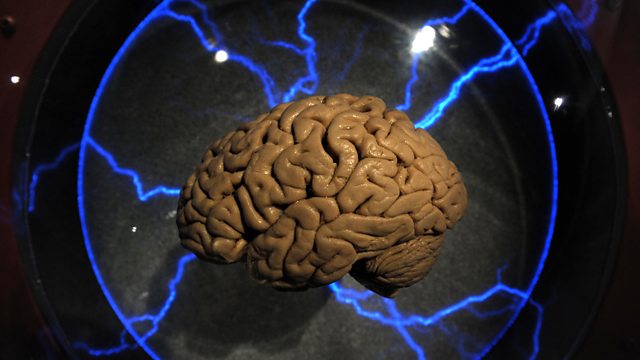Imagination
Imagination in poetry and prose, in tourism and migration, and our brains. With neuroscientist Peter Tse, poet Arundhathi Subramaniam and anthropologist Noel Salazar.
What happens in our brains when we are using our imagination? What role does imagination play in our decisions to visit foreign countries or even to migrate there? And is there something that makes people from a particular place, say India, use their imagination in a unique way? Bridget Kendall talks to neuroscientist Peter Tse, poet Arundhathi Subramaniam and anthropologist Noel Salazar.
(Photo: The human brain. Credit: AFP/Getty Images)
Last on
Clip
-
![]()
Is there a uniquely Indian imagination?
Duration: 01:54
Chapters
-
Peter Tse
What our brain does when we imagine
Duration: 07:36
Arundhathi Subramaniam
Imagination in prose and poetry
Duration: 12:34
60 Second Idea
Walking to stimulate creative thinking
Duration: 04:47
Noel Salazar
Imagining distant lands
Duration: 12:30
Peter Ulric Tse
![Peter Ulric Tse]() Peter Ulric Tse is professor of Psychological and Brain Sciences at Dartmouth College in New Hampshire, USA. His lab looks into the cognitive and neural processes behind our visual perception, attention, consciousness and, recently, the brain activity involved in imagination. The results of his studies suggest that ‘imagination’ is a process which takes place across both sides of the brain, in numerous different regions across the neural network.
Peter Ulric Tse is professor of Psychological and Brain Sciences at Dartmouth College in New Hampshire, USA. His lab looks into the cognitive and neural processes behind our visual perception, attention, consciousness and, recently, the brain activity involved in imagination. The results of his studies suggest that ‘imagination’ is a process which takes place across both sides of the brain, in numerous different regions across the neural network.Arundhathi Subramaniam
![Arundhathi Subramaniam]() Arundhathi Subramaniam is the author of four books of poetry, most recently When God is a Traveller. Her prose works include the bestselling biography of a contemporary mystic, Sadhguru: More Than a Life, and The Book of Buddha. As editor, she has worked on anthologies of essays on sacred journeys in the country, contemporary Indian love poems in English and a book of Bhakti poetry, Eating God.
Arundhathi Subramaniam is the author of four books of poetry, most recently When God is a Traveller. Her prose works include the bestselling biography of a contemporary mystic, Sadhguru: More Than a Life, and The Book of Buddha. As editor, she has worked on anthologies of essays on sacred journeys in the country, contemporary Indian love poems in English and a book of Bhakti poetry, Eating God.
Photo by Tineke de LangeNoel Salazar
![Noel Salazar]()
Noel B. Salazar is Research Professor in Anthropology at the University of Leuven. His research interests include anthropologies of mobility and travel, the local–global nexus, discourses and imaginaries of Otherness, heritage interpretation, culture contacts and cosmopolitanism. He is the author of Envisioning Eden: Mobilizing Imaginaries in Tourism and Beyond.
Sixty Second Idea to Change the World
![Sixty Second Idea to Change the World]() Noel Salazar says that we should walk more: people walk to relax, to exercise, to complete a pilgrimage. Some also walk to think or to stimulate their imagination. Many of history’s great philosophers and writers recognized the benefits of ambulation. So why not generalize walking as a principal method of education and instruction, from preschool onwards? It might stimulate the imagination and creativity that is so desperately needed to solve the world’s problems. And it is much more fun than sitting around a table to ‘brainstorm’ about the next great idea.
Noel Salazar says that we should walk more: people walk to relax, to exercise, to complete a pilgrimage. Some also walk to think or to stimulate their imagination. Many of history’s great philosophers and writers recognized the benefits of ambulation. So why not generalize walking as a principal method of education and instruction, from preschool onwards? It might stimulate the imagination and creativity that is so desperately needed to solve the world’s problems. And it is much more fun than sitting around a table to ‘brainstorm’ about the next great idea.Broadcasts
- Mon 26 Jan 2015 03:05GMT�鶹�� World Service Online
- Tue 27 Jan 2015 09:05GMT�鶹�� World Service Online
Do you use US dollars even though they are not your country’s official currency?
Podcast
-
![]()
The Forum
The programme that explains the present by exploring the past








